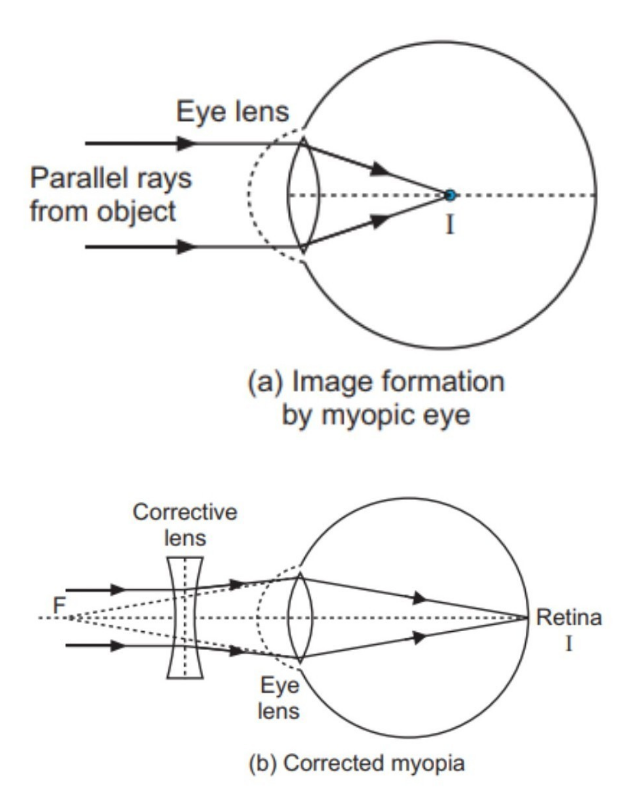
Explain myopia with the help of a ray diagram?
Answer
584.4k+ views
Hint: Myopia is a vision disorder in which we can have a clear look of closer objects but the far objects appear blurry. It is also known as near-sightedness.
Complete step by step answer:
For normal eye functioning, the cornea, and lens bend light so it focuses on the retina. The retina behaves like a screen where the picture is formed by the bending of light rays. It sends the picture to the brain through the optic nerve, which is actually part of the brain.
In a myopic disorder, the eye is longer than normal or has a cornea that is too steep. As a result, light rays focus in front of the retina instead of on it. Therefore, you can see near objects clearly, but distant objects will appear blurred. That’s the reason, this disorder is also called near-sightedness.
To correct the myopic defect of vision, we require a lens that can diverge the incoming rays. Out of both the lenses, the concave lens has the ability to diverge incoming rays. Therefore, it is used to correct this defect of vision. The image is allowed to form at the retina by using a concave lens of suitable power.
The myopic defect of vision as well as its correction is depicted below in the diagram.

Additional Information:
Myopia is a kind of refractive error. By refractive error, we mean that an error in the vision when the eye does not bend the light properly.
Note:
This question requires you to know the exact difference between different types of vision problems.
Myopia can be caused by
1. increase in curvature of the lens.
2. increase in the length of the eyeball
Complete step by step answer:
For normal eye functioning, the cornea, and lens bend light so it focuses on the retina. The retina behaves like a screen where the picture is formed by the bending of light rays. It sends the picture to the brain through the optic nerve, which is actually part of the brain.
In a myopic disorder, the eye is longer than normal or has a cornea that is too steep. As a result, light rays focus in front of the retina instead of on it. Therefore, you can see near objects clearly, but distant objects will appear blurred. That’s the reason, this disorder is also called near-sightedness.
To correct the myopic defect of vision, we require a lens that can diverge the incoming rays. Out of both the lenses, the concave lens has the ability to diverge incoming rays. Therefore, it is used to correct this defect of vision. The image is allowed to form at the retina by using a concave lens of suitable power.
The myopic defect of vision as well as its correction is depicted below in the diagram.

Additional Information:
Myopia is a kind of refractive error. By refractive error, we mean that an error in the vision when the eye does not bend the light properly.
Note:
This question requires you to know the exact difference between different types of vision problems.
Myopia can be caused by
1. increase in curvature of the lens.
2. increase in the length of the eyeball
Recently Updated Pages
Basicity of sulphurous acid and sulphuric acid are

Master Class 12 English: Engaging Questions & Answers for Success

Master Class 12 Social Science: Engaging Questions & Answers for Success

Master Class 12 Maths: Engaging Questions & Answers for Success

Master Class 12 Economics: Engaging Questions & Answers for Success

Master Class 12 Physics: Engaging Questions & Answers for Success

Trending doubts
Draw a labelled sketch of the human eye class 12 physics CBSE

Which are the Top 10 Largest Countries of the World?

Draw ray diagrams each showing i myopic eye and ii class 12 physics CBSE

Giving reasons state the signs positive or negative class 12 physics CBSE

Explain esterification reaction with the help of a class 12 chemistry CBSE

What is defined as a solenoid Depict a diagram with class 12 physics CBSE




